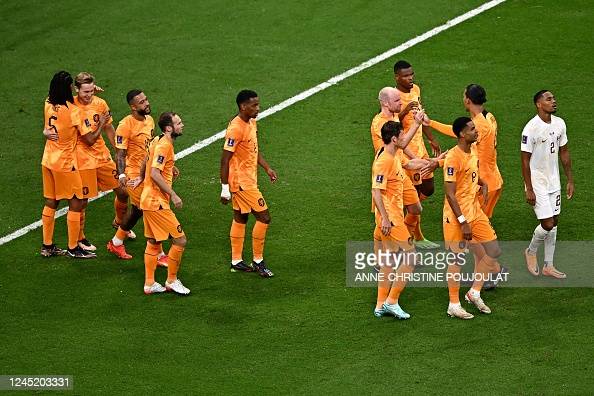Oranje were rarely tested by a largely timid Qatar, who became the first host nation to go out without gaining a single point, but the Netherlands still displayed several traits that could serve them well in the knockout stages.
Senegal were the other nation to go through from Group A, courtesy of their 2-1 win over Ecuador in a game that kicked-off at the same time.
The African champions will face England in the last 16 on Sunday night, after the Three Lions’ 3-0 win over Wales later on Tuesday saw them finish top of Group B.
The Dutch, meanwhile, now know that they will face the USA in their round of 16 match at the Khalifa International Stadium on Saturday, after Gregg Berhalter’s team beat Iran 1-0 to progress from Group B in second place.
-
Gakpo comes to the fore again
It’s now three goals in three World Cup finals matches for the PSV Eindhoven youngster – making him the tournament’s joint top-scorer, at time of writing, alongside Enner Valencia, Kylian Mbappé and Marcus Rashford.
This latest effort also saw him complete a ‘perfect hat-trick’ of group stage goals.
After a brave header in the 2-0 victory over Senegal and a thumping left-footed drive in the 1-1 draw with Ecuador, he capped a clever exchange of passes with Davy Klaassen with a brilliantly accurate right-footed drive from 18 yards here.
Each goal has been an opener. Each goal has been wonderfully different.
And those factors feel like they highlight much of what has been so good about Gakpo so far at this tournament.
He scores goals that matter – and in various different ways.
Having already found the net 13 times for PSV this season, it is increasingly evident why the 23-year-old is attracting the attention of so many top clubs around Europe.
A genuine difference-maker – and a highly flexible one.
-
Klaassen impactful under the radar
Ahead of the tournament, the former Everton man likely wouldn’t have been seen by many as a key cog in the Netherlands machine. It is looking increasingly like he is very much that, however.
The 29-year-old has had a hand in four of their five goals at the tournament so far, having scored the second after coming off the bench against Senegal, teed-up Gakpo’s openers against both Ecuador and Qatar, and put in the cross that led to De Jong getting on the scoresheet against the hosts.
That Klaassen was named player of the match on Tuesday perhaps reflects the increasing recognition of his influence.
Since 2020, he has been back at Ajax – and he hasn’t actually been a regular starter there in recent weeks. After coming on at 0-0 in the 2-0 success against Senegal, though, Van Gaal appears to have liked the look of him in that role just behind the front-two.
No wonder, given those goal-involvement numbers. He has knitted play together and crafted openings with a consistent intelligence.
Him playing there also allows Gakpo to operate within the front-two, after he started the first game in the role that Klaassen is currently occupying.
-
Qatar lacking incision
Once again, the hosts had good moments and displayed some encouraging traits, but there appeared exceedingly little in the way of cutting edge.
That is reflected by the fact that their average Expected Goals rating across their three group games was 0.47. There simply hasn’t been enough in the way of threat or clear-cut chances.
They have rarely been overwhelmed by opposition pressure, but they never truly seemed to have either Ecuador, Senegal or the Netherlands on the back foot.
The front-two of Almoez Ali and Akram Afif – their key attacking outlets – looked encouraging in flashes but appeared to have their influence all too easily limited within each of the three group matches.
-
Promising elements to build on
There have still, however, been some good signs. With this tournament being Qatar’s first World Cup finals appearance, stepping up to this level was always going to be a challenge.
Some of the elements that helped build optimism for them in recent years and months were visible. They often looked neat and tidy in possession and very capable of retaining the ball for a good period of time.
That, needless to say, tends to be a valuable trait in international football. What didn’t come with it, though, was an ability to genuinely impose themselves on any of their three matches or opponents.
Whether it be varying their game and going direct more regularly or putting more emphasis on positive aggression both in and out of possession, they now look like they need to develop a more rounded approach that can ask difficult questions of opponents.
This tournament has been undeniably disappointing for them, but it may well prove a helpful experience in the long run.










































